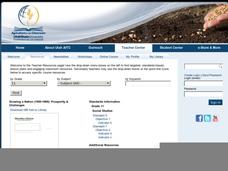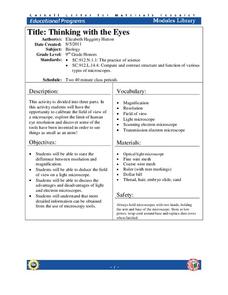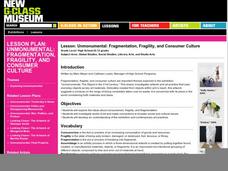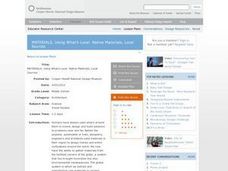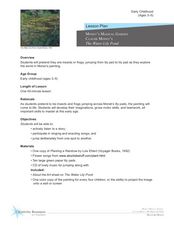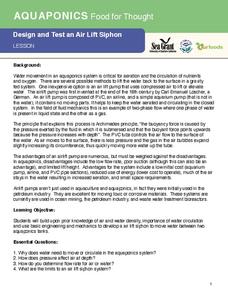Curated OER
Exploring Mars
Learners, working in small groups construct scale models of the planets and solar system. They examine images of Mars and discuss what might have caused the features. They record facts about their planetary research in their journals and...
Curated OER
Earth: Our Big Blue Marble
Students investigate Earth and its resources. In this Earth, space, and nature lesson plan, students collaborate to design presentations on the Earth, its cycles, and how humans have impacted the planet. Images, diagrams, and background...
Agriculture in the Classroom
Growing a Nation (1950-1969): Prosperity & Challenges: The Story of American Agriculture
A wonderful lesson on the development and impact of mechanized farming! History or agriculture classes learn the historical background of the United States' food production by creating a pamphlet with information on the cause and effect...
Curated OER
Creating My Own Rube Goldberg Machine
Students dissect simple machines. In this simple machines lesson, students gather simple machines from their home to dissect in class. Students investigate the working parts of simple machines and construct a machine based on the designs...
NASA
Collecting Electromagnetic Radiation
Astronomy is literally over your head, but this lesson will explain how we study it. Young scientists make telescopes, calculate and compare the light gathering power of lenses, and simulate detection of infared radiation. Materials...
PHET
Pre- and post-assessment (High School)
Need to gauge your pupils' understanding before the lesson begins? A base assessment includes short answer and drawings to determine pupil knowledge. Advanced assessment covers vector addition.
Teach Engineering
The Amazing Aerogel
Introducing ... the aerogel. The first of a two-installment series teaches young engineers about the properties and uses of aerogels. A PowerPoint presentation provides information about this unique material to help solidify the concept.
Cornell University
Thinking with the Eyes
Objects are larger (or smaller) than they appear! Scholars use a laboratory investigation to explore the difference between resolution and magnification. The activity allows them to calculate the size of the field of view of their light...
Curated OER
True North, Magnetic North
Students explain why compass angles need to be corrected for regional magnetic variation. They observe the difference between magnetic and true north. Each student measures the angle of variation for a town in a different state.
Curated OER
Let's Get it Together! Reading to Learn
Let’s learn about frogs! Young readers are led through “Freaky Frogs,” a non-fiction article. Teach learners how to edit an article so there are fewer details to sift through. After talking through the article, they learn the six steps...
Curated OER
Lesson: Unmonumental: Fragmentation, Fragility, and Consumer Culture
Looking at art is the first step to analyzing it. And, if you can analyze art, you can analyze anything. Kids examine several pop art pieces that represent consumerism in modern culture. They discuss multiple facets of each piece and...
Curated OER
A Design You’ll Dig: Designing a Habitat for Worms
Young scholars discover how worms contribute to the balance of the environment. In this composting lesson, students study the composting and decomposition processes. Young scholars then create habitats for worms that allow them to do...
Curated OER
MATERIALS, Using What’s Local: Native Materials, Local Sources
Young scholars consider the development of different societies. In this environmental building instructional activity, students consider local resources and how societies choose to use them. Young scholars use their findings to design a...
Curated OER
Monet's Magical Garden
Students study classic paintings by masters like Monet. In this art history lesson plan, students listen to the story Planting a Rainbow by Lois Ehlert and sing flower songs with the rest of their class. Students examine the painting The...
Curated OER
Structure and Function of the Cell/Introduction to the Cell
So, this is not technically a learning exercise, but rather a chapter of reading material, pictures, and diagrams introducing young biologists to the cell. Cell theory, diversity, size, and shape are described. The internal organization...
Curated OER
Reading Comprehension 4: level 9
Whether you use this reading comprehension worksheet as the basis for a short lesson on comprehension strategies or for additional practice, the passage about tricky octopi is sure to engage the interest of your young scientists.
It's About Time
Polymers
All plastics contain polymers, but not all polymers are plastic. Young chemists make their own polymer and compare the properties to those of other states of matter. After a reading passage, pupils answer analysis questions about natural...
National Energy Education Development Project
Exploring Hydropower
In 2006, about 20 percent of the world's electricity was generated from hydroelectric power. In the presentation, scholars review the water cycle and gravitational energy to begin to understand how humans harness the power of water. They...
Messenger Education
Snow Goggles and Limiting Sunlight
Why would someone need contact lenses that offer UV protection? With a 28-page packet full of instruction and worksheets, learners discuss solar radiation and its potential harm to eyes. They make snow goggles similar to ones hunters...
University of Southern California
Design and Test an Air Lift Siphon
Build an air lift siphon using your mad physics skills! Learners first investigate the importance of circulating water in aquaponics systems. They then use density to their advantage as they engineer an air lift siphon
Biology Junction
Viruses, Viroids, and Prions
Are viruses living or non-living? According to the presentation, they are both and neither. Clearly, this requires clarification and an in-depth look at viruses, viroids, and prions. Young scientists learn about the history, structure,...
International Technology Education Association
Reinventing Time
Take a trip through time. A lesson resource provides instruction on the origin of current measurements for time. The text explains the different tools humans used throughout history to measure time as well as provides examples such as...
American Museum of Natural History
What's This? Feeding
Some species have pretty creative methods for catching food. Young scientists learn about some interesting ways organisms get the nutrients they need by navigating an online interactive lesson that would be suitable for a remote learning...
American Museum of Natural History
Create a Compass
Historically, humans have used many methods of finding due north. Using a hands-on activity, learners create their own compasses. They then test their compasses in their neighborhood or to assist with stargazing.
Other popular searches
- Science Inventions 6th Grade
- Science Inventions 1st Grade
- Ancient Science Inventions
- Science Inventions 6th
- Incidence Science Inventions
- Physical Science Inventions
- Science Inventions Eliticity
- Ancience Science Inventions
- Science Inventions Eletisty
- Science Inventions Elitist
- Science Inventions Elasticity




